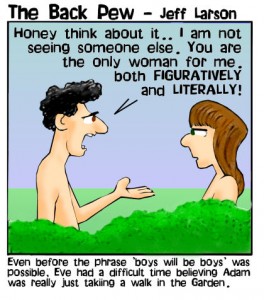So – you are ‘in love’. Got that in-the-clouds feeling of wanting to see, do things with, make love to—just be with—your beloved? That burst of energy when you see her. That heart-palpitating, pupil-dilating feeling when he walks into the room.
You are fearless; you would do anything, say anything, and fight any battle for your loved one. Your beloved is perfect, faultless, precious … angelic.
This is romantic love, or as the scientists call it ‘Limerance’. And they are the result of changes in your brain that make you focus your energy on one person. You are motivated to pursue this particular person for the reward of intimacy and ownership—you fall in love with him or her.
The Bible recognises the power of romantic love in Song of Songs:
for love is as strong as death, its jealousy unyielding as the grave. It burns like blazing fire, like a mighty flame. Many waters cannot quench love; rivers cannot sweep it away. (8:6b–7a)
Shakespeare wrote of love in Romeo and Juliet: ‘Love is a smoke made with the fume of sighs. Being purged; a fire sparkling in lovers’ eyes, being vexed, a sea nourished with lovers’ tears. What is it else? A madness most discreet, a choking gall and a preserving sweet’.
It is fire, it is a sea, it is sweet and bitter … it is love. And it is brain chemistry!
This falling in love phenomenon[1] is associated with a spray of the chemical dopamine from areas associated with reward and motivation, to the rest of the brain. Other chemical changes include an increase of norepinephrine and a decrease in serotonin. This spray of dopamine leads to a lover’s high: focused attention on their loved one, rearrangement of priorities, increased energy and mood swings. The increase in norepinephrine brings on sweating and a pounding heart, emotional dependence and elevated sexual desire. The drop in serotonin causes a mini obsessive-compulsive state with feelings of sexual possessiveness, jealousy, compulsive thinking about him or her, and a craving for emotional union with this one person. All these reactions push up the level of testosterone in the brain and the desire for sexual intimacy with the loved one.
Other parts of your brain are also affected. The part of the brain that determines feelings of fear is inhibited, as is the part of the cerebral cortex that influences your judgement. Anyone who has been in the throes of romantic love can understand it: love is fearless. And yes, love is blind.
The power of love is why rejection and failure in love can be truly ‘biologically’ painful. Being ‘in love’ is chemically like an addiction or obsession, and therefore loss felt at a neurochemical and whole body level. It can induce clinical depression and, in extreme cases, stalking, homicide and sometimes, even suicide.[2]
The intense power of romantic love is also why we need to take extreme care when we deal with the emotion. Falling in love should come with a ‘handle with care’ warning.
And that is why the Bible tells us to be aware of how we deal with this emotion. Three times in the Song of Songs (2:7; 3:5; 8:4), the woman exhorts her friends to take care when arousing the passions of desire and love: ‘Do not arouse or awaken love until it so desires’.
Fortunately this love-crazed phase lasts only 12–24 months. We wouldn’t survive it for much longer than this!
You need to be wise and very cautious in your response to the emotional rollercoaster of falling in love. Love is both affection (feeling, emotion) and voluntary action. The neurochemical cocktail will draw you to your beloved; you ‘fall’ in love. You are motivated to pursue the reward of intimacy with your loved one. This is the feeling, accompanied by the kick in the gut of testosterone-driven sexual desire, that sends your sex drive into a tail spin.
But, as a human with a higher cerebral control system and the ability to choose your response, what you do to follow up the urge is up to you. You can choose to follow the lustful path of immediate gratification, not caring about the consequences, either for yourself, your partner or anyone else. Or you can stop and let wisdom guide your next action. Loving actions of restraint and other-focused caring when chemicals are screaming for satisfaction is a conscious choice.
When it comes to sex before marriage, this approach of patient waiting seems out of step with society, which works on a ‘try before you buy’ relationship pattern. The world calls you to follow your feelings. ‘If it feels good you should do it.’ ‘You have a right to happiness.’ ‘Nobody should tell you not to pursue your personal satisfaction.’ ‘After all, you are engaged to be married—why wait?’
Look around you. Society’s consumerist model to relationships takes many forms. It includes everything from testing out sexual compatibility with a series of casual affairs, to a partly relational ‘friends with benefits’ status, and cohabitation. These relationships represent a sliding scale of commitment without the ‘till death do us part’ wedding vows.
God instructs us that ‘marriage should be honoured by all, and the marriage bed kept pure’ (Hebrews 13:4). Sexual purity and premarital sex are not compatible.
In a sexualised culture, Christian couples sometimes wonder: Does following the world view of cohabitation and premarital sex bring contentment and happiness? All their friends are doing it. And they seem to be having fun.
Why should a Christian couple behave differently?
Let’s explore this in the next post.
[1] Fisher, H, Aron, A & Brown, L 2006, ‘Romantic love: a mammalian brain system for mate choice’, Philosophical Transactions of the Royal Society Bulletin, 361, pp. 2173–2186.
[2] Fisher, H, Aron, A, Brown, L, Strong, G & Mashek, D 2010, ‘Reward, addiction, and emotion regulation systems associated with rejection in love’, Journal of Neurophysiology, 104, pp. 51–60.




Recent Comments